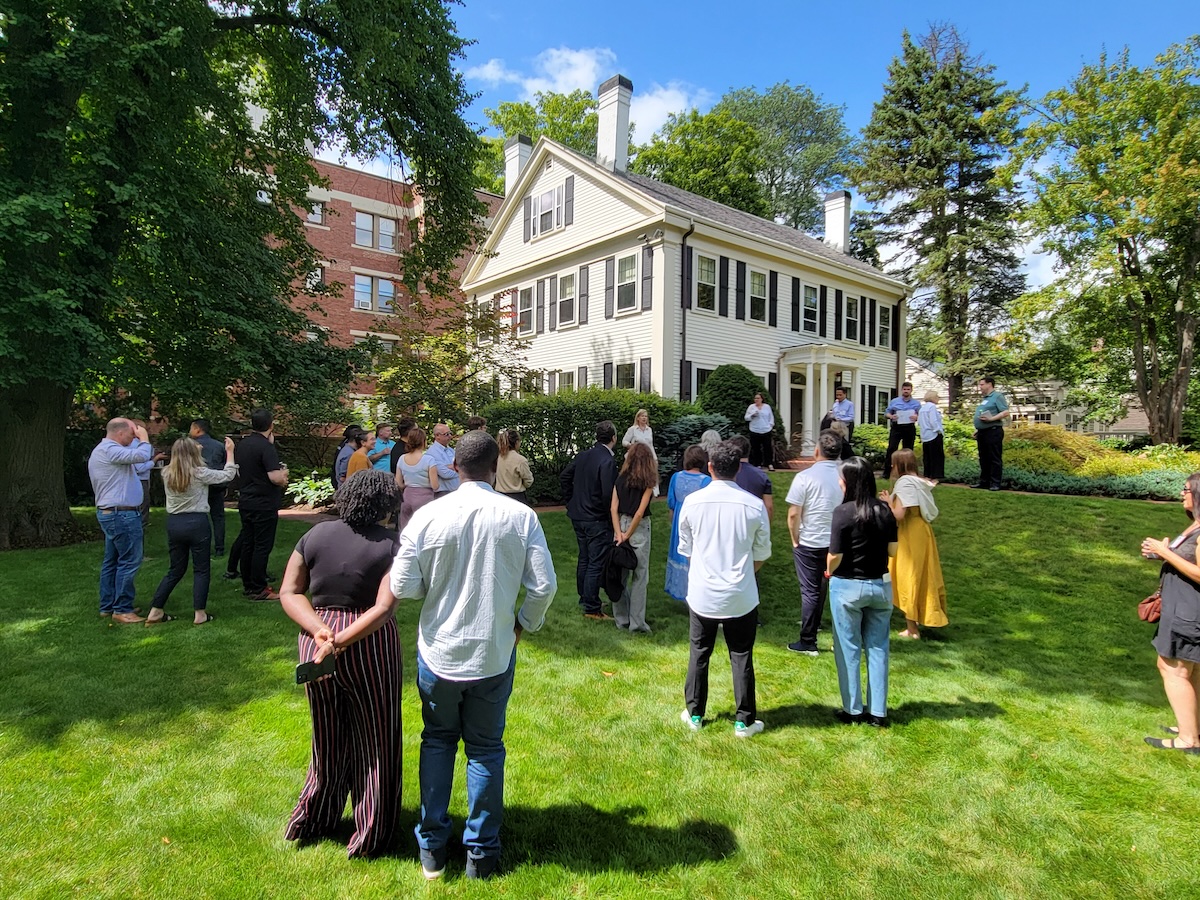The Fellowship Year
The journalists selected as Nieman Fellows each year take a broad range of courses at Harvard and MIT and participate in programming created exclusively for them, including seminars, shop talks, workshops and the popular narrative nonfiction writing class taught by author Steve Almond. They also attend many of the countless events and lectures that are scheduled on campus each week.
The fellows take turns preparing and presenting Soundings, talks in which they explore and explain why they do what they do as journalists. They also occasionally organize DIY sessions, inviting guests to discuss their work, or plan workshops to share their own work and expertise and teach their classmates new skills. The fellows moderate many of the talks scheduled at Lippmann House, Nieman’s home on the Harvard campus.
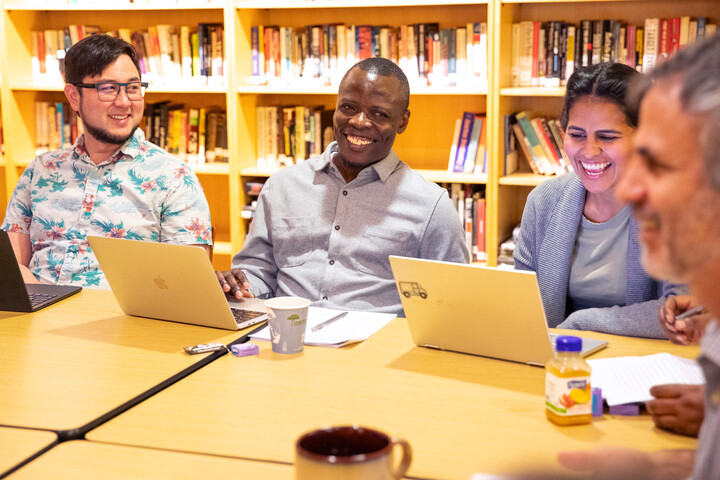
They additionally speak in classes and in Harvard Houses, participate in panel discussions and conferences, and mentor student journalists at The Harvard Crimson, the university’s independent student newspaper.
In the fall, the fellows start the year with a lightning round of talks about their work and each spring, they learn about the book industry and pitch their book ideas during a workshop with publishing executives and literary agents organized by author and 1994 Nieman Larry Tye. This spring, Tye invited publishers Lisa Lucas and Peter Hubbard and literary agent Joy Tutela to meet with the fellows.
Engagement on Campus and Beyond
The fellows share their knowledge and skills with the Harvard community in a variety of ways and settings throughout the year.
In January, Denise Hruby, an Austrian environment and investigative journalist focusing on the climate and biodiversity crises, was interviewed by Harvard’s Salata Institute for Climate and Sustainability about her work and good and bad climate journalism. In June, she moderated “Climate in the Newsroom: An Inside Look” a panel discussion that took place during Harvard Climate Action Week, and she spoke about with Chris Davis, associate director of the Career and Academic Resource Center at Harvard’s Division of Continuing Education, for the CARC Podcast “Climate in the Newsroom.” Hruby is now a climate reporter for the Miami Herald.
Denise Hruby and Cristela Guerra, a senior arts and culture reporter at WBUR in Boston, spoke at Boston University’s 2024 Power of Narrative Conference in March. Hruby led a session on “Crafting Climate Stories that Give Hope – And Inspire Action.” Guerra’s discussed “Queering the Narrative: Centering LGBTQ+ Voices in Covering the Community.”

Guerra also moderated the May webinar “Pediatric Health Care in Immigration Detention: A Call for Policy Change and Child Rights” hosted by the FXB Center for Health and Human Rights at Harvard. Speakers discussed a report about migrant children held in detention, legal challenges in the current political climate, the need for increased transparency in the border security process and oversight of child-specific processes.
Nieman Fellows Andrew Ryan, Lebo Diseko, Javier Lafuente and Ilya Marritz spoke about their work to a group of student journalists at Boston Latin High School.
Rachel Pulfer the 2024 Martin Wise Goodman Canadian Nieman Fellow and president of Journalists for Human Rights in Toronto, gave a talk at Harvard’s Weatherhead Center for International Affairs about “Canadian Leadership through Media Development: How Truth and Facts Can Change the World.”
Pulfer also led a conversation with Canadian MP Karina Gould at Harvard Kennedy School about Gould’s public sector programs aimed at supporting families, including publicly subsidized daycare. She moderated another Weatherhead talk at the Harvard Faculty Club with Canadian journalist Lisa LaFlamme, who discussed “The State of Journalism and Its Impact on Democracy.”
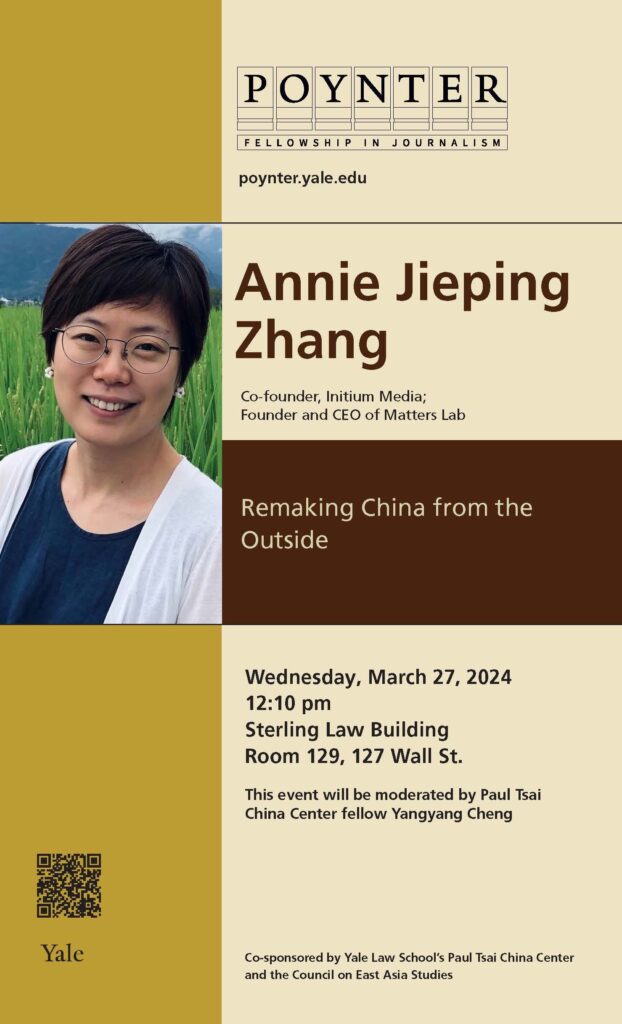
Annie Jieping Zhang, founder of Matters Lab, a decentralized social media platform in Hong Kong and Taiwan, and the Nowhere bookstore, which serves the Chinese diaspora, spoke about “Remaking China from the Outside” at Yale University’s Paul Tsai China Center. She discussed changes in mainland China, Hong Kong, Taiwan and overseas Chinese communities and potential paths of societal transformation.
Manasseh Azure Awuni, founding editor-in-chief of The Fourth Estate, a nonprofit investigative journalism project in Ghana, and Ukrainian journalist Yana Lyushnevskaya, a senior journalist at BBC Monitoring, spoke at the 25th International Symposium on Online Journalism (ISOJ) at the University of Texas at Austin in April. Awuni spoke about the deterioration of press freedom in his country, which he was forced to leave in 2019 due to death threats he received for his investigations into government corruption. Lyushnevskaya described what war has done to Ukrainian media and the risks for journalists in her homeland.
Wendi C. Thomas, NF ’16, founding editor and publisher of MLK50: Justice Through Journalism, was a keynote speaker at ISOJ, presenting her talk “Speak what you seek until you see what you’ve said: Creating a gutsy vision for local news.” Mónica Guzmán, NF ’16, author and a senior fellow for public practice at Braver Angels, also spoke at ISOJ about “How should journalism and platforms constructively address the global challenge of polarization?”
Texas Tribune politics reporter James Barragán delivered the 2024 Nossiter Lecture at Dartmouth College: “No Time for Apathy: Why the American Public Must Fully Engage in Democracy.”
Beandrea July, an independent arts and culture journalist, film critic and audio producer, was a guest lecturer in the “Introduction to Media Studies” class at MIT and spoke about film criticism.
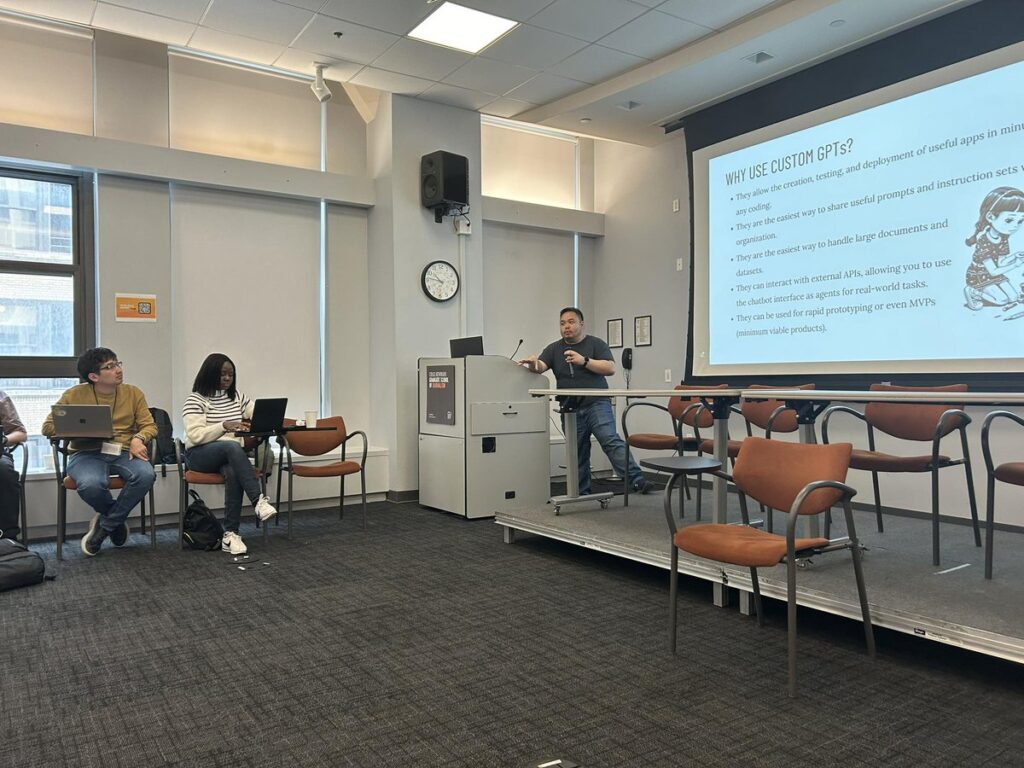
Jaemark Tordecilla, former head of digital media at GMA News in the Philippines, researched the use of AI tools in newsrooms and created a custom GPT to advance watchdog journalism. He taught a session on AI tools for the inaugural cohort of the AI Journalism Lab at the Newmark J-School in New York and spoke about his work for the CARC Podcast “AI and Journalism.” His research was also featured in several articles:
- “I created an AI tool to help investigative journalists find stories in audit reports. Here’s how I did it and why it matters”
- “Filipino journalist upends industry’s AI doomsday fears with custom chatbot to aid in-depth reporting”
- “Filipino journalist creates AI tool to detect stories in government audit reports”
Javier Lafuente, deputy managing editor of the American edition of the Spanish newspaper El País, and Juan Luis Manfredi, a professor of journalism and international studies at the University of Castilla-La Mancha in Spain, spoke about disinformation, journalism and threats to democracy in Latin America during an event co-sponsored by the Weatherhead Center for International Affairs and the David Rockefeller Center for Latin American Studies.
Lafuente also spoke about “Journalism in Latin America: Reporting in Minefields” during an event moderated by Steven Levitsky, director of the David Rockefeller Center for Latin American Studies at Harvard.
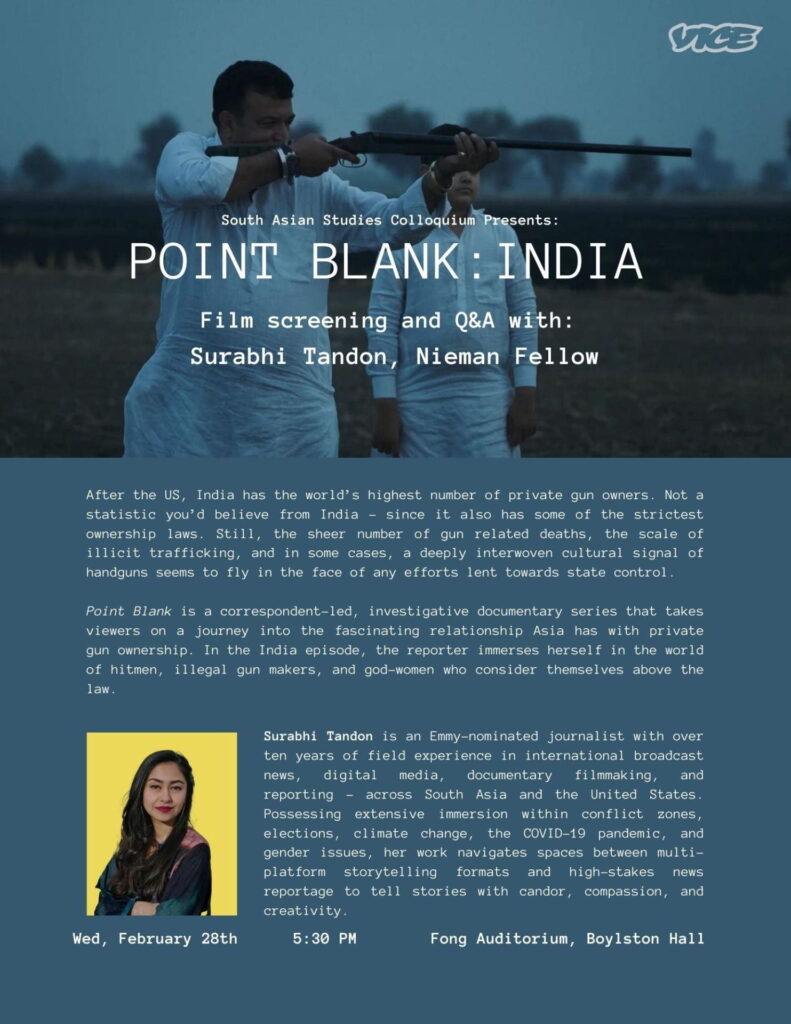
Surabhi Tandon screened her Vice documentary “Point Blank: India” and participated in a Q&A session during an event sponsored by the South Asian Studies Colloquium. The film is part of an investigative series that examines the relationship Asia has with private gun ownership. After the U.S., India has the world’s highest number of private gun owners.
Elsie Chen, a Chinese journalist who worked for The New York Times in Beijing and Seoul, moderated a talk at Harvard’s Shorenstein Center on “Chinese Independent Film and Distribution of Public Interest Media.”
Sarah Varney, a senior correspondent for KFF Health News and a special correspondent and commentator for PBS NewsHour, spoke on a panel discussing “Reproductive Rights in Post-Roe America” at the Women in Power Conference, a student-run event at Harvard Kennedy School.
Jikyung Kim, deputy editor of political news at the Munhwa Broadcasting Corporation (MBC) in Seoul, spoke on a panel at Harvard Kennedy School about South Korean legislative elections.

Julia Barton, former VP and executive editor at the audio production company Pushkin Industries, was featured in the Story Insider podcast “Who Else Knew That the Sinking of The Titanic Eventually Led to Podcasting?” She discussed the research she conducted on the history of audio production and other things she learned during her fellowship at Harvard.
Barton also ran an active podcasting club for and with her Nieman classmates and spoke at the “In the Field 2” symposium on recorded sound held in London in July. For Nieman Lab, she wrote “In 1924, a magazine ran a contest: “Who is to pay for broadcasting and how?” A century later, we’re still asking the same question.”
Ilya Marritz, a reporter who covered threats to democracy for ProPublica and Trump legal matters for NPR, was a guest speaker on the webinar “Investigating Political Nonprofits, Scam PACs and More,” which introduced ProPublica’s new 527 Explorer searchable database.
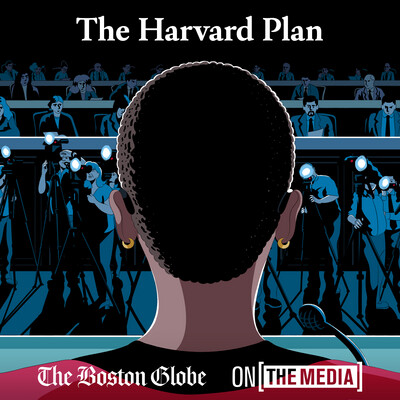
Marritz also hosted “The Harvard Plan,” a three-part podcast from The Boston Globe produced in partnership with WNYC’s “On the Media.” The series takes listeners inside the upheaval at Harvard University last year and explores the rise and fall of Claudine Gay’s presidency.
Several Nieman Fellows from the class of 2024 taught classes at Harvard Summer School, run by the Harvard Division of Continuing Education: Denise Hruby, Feature Writing: Sarah Varney, News Reporting and Writing: Julia Barton, Podcasting; and Andrea Patiño Contreras, Video Journalism: The Short Documentary.
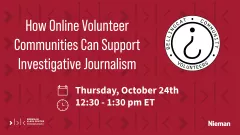
Johanna Wild, an open-source researcher at Bellingcat, designed and built a new Online Investigations Toolkit with help from Bellingcat’s volunteer community during her time as a 2024 Nieman-Berkman Klein Fellow in Journalism Innovation. Wild spoke with Berkman Klein’s Sam Hinds about the benefits and risks of using novel open-source intelligence (OSINT) tools and led a webinar on “How Online Volunteer Communities Can Support Investigative Journalism.”
Jesselyn Cook, a Canadian American author and journalist, spoke about her book “The Quiet Damage: QAnon and the Destruction of the American Family” during an event at Harvard Book Store moderated by Nieman classmate Gina Smith, the investigations and projects editor for McClatchy’s South Carolina newspapers. Cook also spoke to The Boston Globe and The Harvard Gazette about the book and the toll of QAnon on families of followers.
Ben Reininga, a 2025 Nieman-Berkman Klein Fellow and head of editorial at Snapchat, spoke about effective social messaging at the Harvard T.H. Chan School of Public Health. He also moderated a panel talk and film screening and about HIV/AIDS at the Harvard Art Museum.
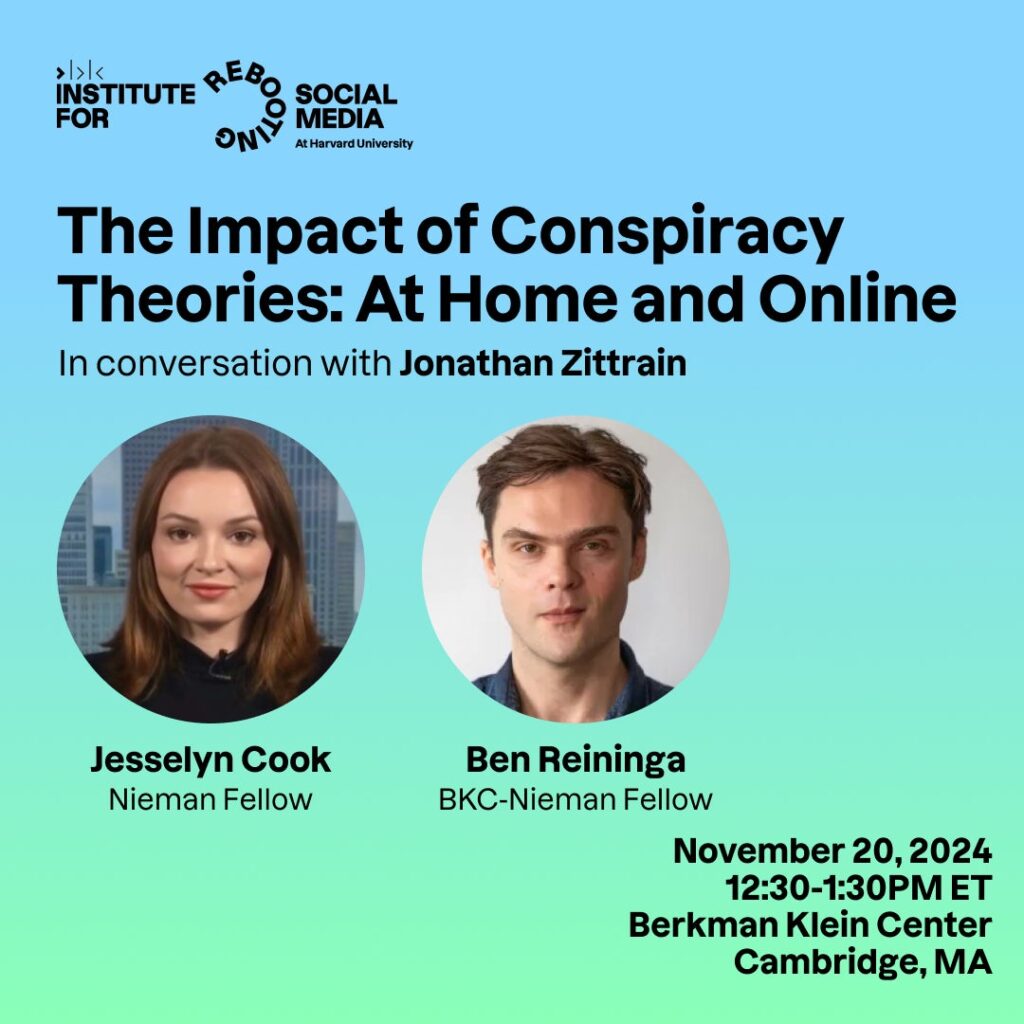
Cook and Reininga spoke about “The Impact of Conspiracy Theories at Home and Online” in a Berkman Klein event hosted by The Institute for Rebooting Social Media in November. They shared their insights into how platforms navigate the spread of conspiracy theories and the impact they have on individuals, families and communities. The talk was moderated by BKC Faculty Director Jonathan Zittrain.
Cook, Reininga and their Nieman classmate Tyrone Beason, a staff writer for the Los Angeles Times’ environment, climate, health and science team, also met with writers and editors at the Harvard Political Review to discuss their work in journalism. The political journal is written and published by Harvard undergraduates.
Lina Chawaf, a Syrian journalist and CEO of Radio Rozana, an independent Syrian media network that broadcasts from France, spoke with Northwestern University political science professor Wendy Pearlman about “The Home I worked to Make: Voices from the New Syrian Diaspora.” The talk was part of the Middle East Seminar series sponsored by the Weatherhead Center for International Affairs and the Center for Middle Eastern Studies.
After the sudden downfall of Syrian President Bashar al-Assad in December, Chawaf shared her thoughts about what reporters may face under the new regime in Nieman Reports and wrote the Boston Globe opinion piece “I fled Assad’s brutal regime in Syria. Will his replacement be any better?” She additionally contributed to the Washington Post opinion column “Assad is gone. What’s next for Syria?”
Mike Shum, a filmmaker who works as a director, producer and cinematographer for “PBS Frontline” and other outlets, joined fellow filmmaker Serginho Roosblad to host an online screening and discussion of their Frontline documentary “Documenting Police Use of Force.” California State University, San Bernardino, hosted the event.

Shum also joined Raney Aronson-Rath, PBS Frontline’s editor-in-chief, and Frontline filmmakers Michael Kirk, NF ’80, and Gabrielle Schonder, NF ’22, and James Jacoby to discuss the group’s documentaries about the 2024 U.S. presidential election.
Marcus Yam, a foreign correspondent and photojournalist with the Los Angeles Times, was a speaker at the 2024 Eddie Adams Workshop, a four-day photojournalism seminar in upstate New York held every Columbus Day weekend.
Nilesh Christopher, an India-based journalist who covers the intersection of technology, business and society. gave a talk at the 2024 ISAT Fall Conference on generative AI’s impact on elections. The Information Science and Technology (ISAT) Study Group, part of the Defense Advanced Research Projects Agency (DARPA), brings together some of the nation’s top computer scientists, engineers and information technologists.
Soundings
- Less Arguing, More Doodling
The virtues of taking a different route with sports journalism
By Julian Benbow, NF ’24
- Standing Up to Corruption and Violence
Jaemark Tordecilla, NF ’24, on the harassment, brutality, and financial pressures faced by journalists in the Philippines
